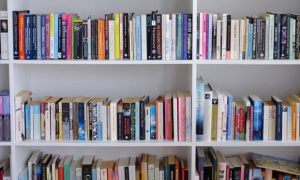Anakana Schofield in The Guardian:
 The latest TV series by charming, tidy-up guru Marie Kondo has landed on Netflix and while we are all in love with the vibrant folk featured in her show, last week I accidentally entered the damning territory of disagreeing with Kondo’s philosophy – in a tweet that went viral. For while I’d heed Kondo’s “Konmari method” for habits such as folding T-shirts, she is woefully misguided when she says we should get rid of books that don’t give us “joy”. Present tally among the 25,000-plus tweets replying to mine: 65% agree with me, 20% disagree, 3% think we are fighting over a football team and 5% insist Kondo’s position is way more nuanced than I give credit for. The rest insist I am a joyless frump. But be assured that this joyless frump will not be following Kondo’s advice, to essentially hold my books against my teats and left ventricle to see if they spark joy. If my own novels are anything to go by, I should be slightly concerned if the most recent, Martin John, sparked joy in anyone other than a convicted sex offender or a forensic psychiatrist.
The latest TV series by charming, tidy-up guru Marie Kondo has landed on Netflix and while we are all in love with the vibrant folk featured in her show, last week I accidentally entered the damning territory of disagreeing with Kondo’s philosophy – in a tweet that went viral. For while I’d heed Kondo’s “Konmari method” for habits such as folding T-shirts, she is woefully misguided when she says we should get rid of books that don’t give us “joy”. Present tally among the 25,000-plus tweets replying to mine: 65% agree with me, 20% disagree, 3% think we are fighting over a football team and 5% insist Kondo’s position is way more nuanced than I give credit for. The rest insist I am a joyless frump. But be assured that this joyless frump will not be following Kondo’s advice, to essentially hold my books against my teats and left ventricle to see if they spark joy. If my own novels are anything to go by, I should be slightly concerned if the most recent, Martin John, sparked joy in anyone other than a convicted sex offender or a forensic psychiatrist.
…I read in a variety of ways – ebooks, audiobooks – and never mind donating or sharing books. But I can’t imagine what a blank collection of physical books I’d be left with if they had to spark joy. (Goodbye Jelinek, Bernhard and Kafka, hello books with photos of hippo feet.) When I look at my shelves, I marvel at how random books have ended up beside each other. Some are on my shelf on the strength of just one line or a paragraph. Some are gifts, others I found discarded in the street. But every purchase of a book is a gesture of faith in the writer who wrote it. Writers are nothing without readers. Rather than following Kondo’s rules, I’d like to suggest another: it should be obligatory that all living spaces come with built-in bookshelves. (And a hammock.)
More here.
